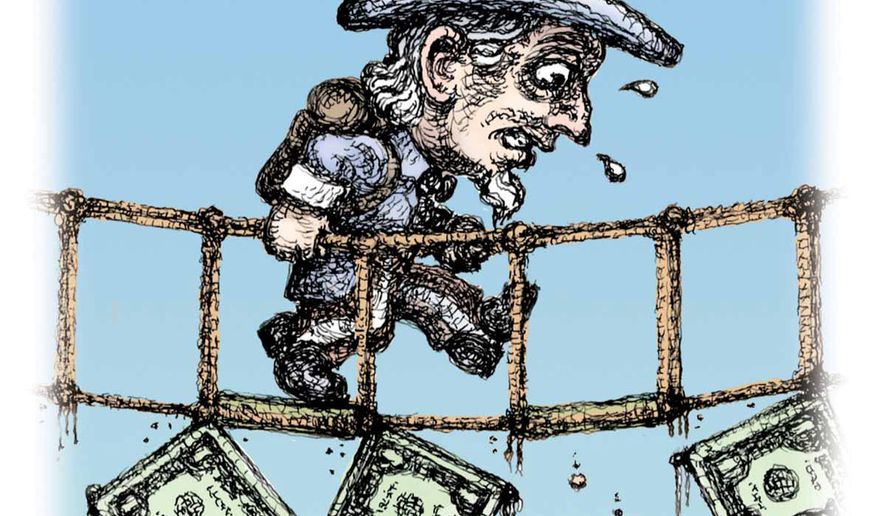OPINION:
Tighten your seat belts because the U.S. economy is in for another frightening bumpy ride that Federal Reserve Chair Janet Yellen calls the “new normal.”
That means we’re facing a prolonged period of much slower job creation and painfully anemic economic growth in the middle of a deeply divisive presidential election.
In a downbeat assessment of the economy’s prospects, the Fed again postponed raising interest rates in the face of weakening economic data that is teetering on the edge of another recession.
Under Ms. Yellen’s leadership, the Fed has been notorious for its exaggerated, and ultimately false forecasts that the Obama economy was making a comeback, only to see its growth rate decline to alarming levels.
The economy’s growth rate shrank to 1.4 percent in last year’s fourth quarter, then plummeted to 0.8 percent in the first three months of this year.
And the Fed doesn’t expect the Obama economy to do much better over the next two years.
“Yellen also broke out the phrase ‘new normal’ to explain why central bank officials expect rates and economic growth to remain low through 2018,” the CNBC business network reported Thursday.
The Fed cut its economic growth forecast Wednesday from 2.2 percent to 2 percent for the year, a failing rate by any measure.
Since the Great Recession, the central bank has been trying to wean the Obama economy away from its near zero interest rate stimulus.
Each time it considered doing so, Fed officials decided that the economy was still far too fragile for even a modest rate hike. Its first interest rate increase came in December, and there were promises of higher rates to come, but this time Ms. Yellen refused to say when the next increase might occur.
“The economic outlook is inherently uncertain,” Ms. Yellen said. “Assessment of appropriate policy is also necessarily uncertain, especially at longer time horizons, and will change in response to changes to the economic outlook and associated risks.”
Her gloomy expectations of a more sluggish economy sent shock waves through the financial markets, and stock prices plunged this week in yet another roller-coaster ride that has defined Barack Obama’s presidency and his economy.
That is wreaking economic havoc with workers’ 401(k) and IRA funds, as well as labor union pensions — hurting small businesses and driving the economy down to critical recessionary levels.
Politically, this should be hurting the Democrats badly, but Donald Trump has failed to take full advantage of the central economic issue of our time.
Instead of pounding the weakening economy for all its worth, and attacking Hillary Clinton for her big spending, tax-hiking agenda, Mr. Trump has increased the volume on banning Muslims from entering the United States, and other racial-immigrant issues that are way down on the polling list of the nation’s biggest concerns.
Before this week’s Orlando massacre, Mrs. Clinton has been pulling away from her rival in the polls, with a double-digit 12-point lead — 49 percent to 37 percent, according to a Bloomberg poll of likely voters. Notably, Libertarian Party leader Gary Johnson drew a surprising 9 percent.
But will the killing of 49 people in an Orlando nightclub by a deranged American Muslim terrorist, who said he was doing the work of the Islamic State, become a major issue in the general election?
Mr. Trump has turned a tragic event by a lone gunman into his fierce campaign against Muslim immigrants. Mrs. Clinton has focused on the issues of terrorism and gun control.
Last December, the issue of terrorism rose “to the top of the list of Americans’ concerns” in the wake of the deadly terrorist attacks in Paris and San Bernardino.
And “it could happen again in the wake of Sunday’s horrific massacre in Orlando,” writes Jim Norman at the Gallup Poll.
But by January, “both the government (16 percent) and the economy (13 percent) moved back ahead of terrorism (9 percent) as the most important problem, and they have been the issues most often mentioned in every poll so far this year,” Mr. Norman reports.
“In a poll earlier his month, before the Orlando shooting, 18 percent of U.S. adults said the economy was the nation’s most important problem, 13 percent named the government and only 4 percent named terrorism.”
So “if the same pattern occurs this time, terrorism would likely not remain the most important issue for long,” he adds.
Still, the issue has intensified in the wake of the worst mass murders by a single gunman in U.S. history and will likely be a critical part of our nation’s election dialogue.
Years of polling suggests that four months from now, the voters will turn to the issues that deal with their immediate day-to-day concerns in a worsening economy that endangers their jobs, businesses, and financial well-being.
For Trump, these are not the kind of red-meat issues that fire up and excite his legions of supporters.
Accusing Mrs. Clinton of being “crooked” and questioning President Obama’s patriotism may trigger roars of approval at his rallies, but they don’t deal with the bread-and-butter issues that worry most Americans.
The dreadful Obama economy has handed Republicans the White House on a silver platter. But by week’s end, the Republican standard-bearer was running well behind Mrs. Clinton who is offering voters four more years of the failed policies that’s gotten us into the mess we’re in now.
• Donald Lambro is a syndicated columnist and contributor to The Washington Times.




Please read our comment policy before commenting.